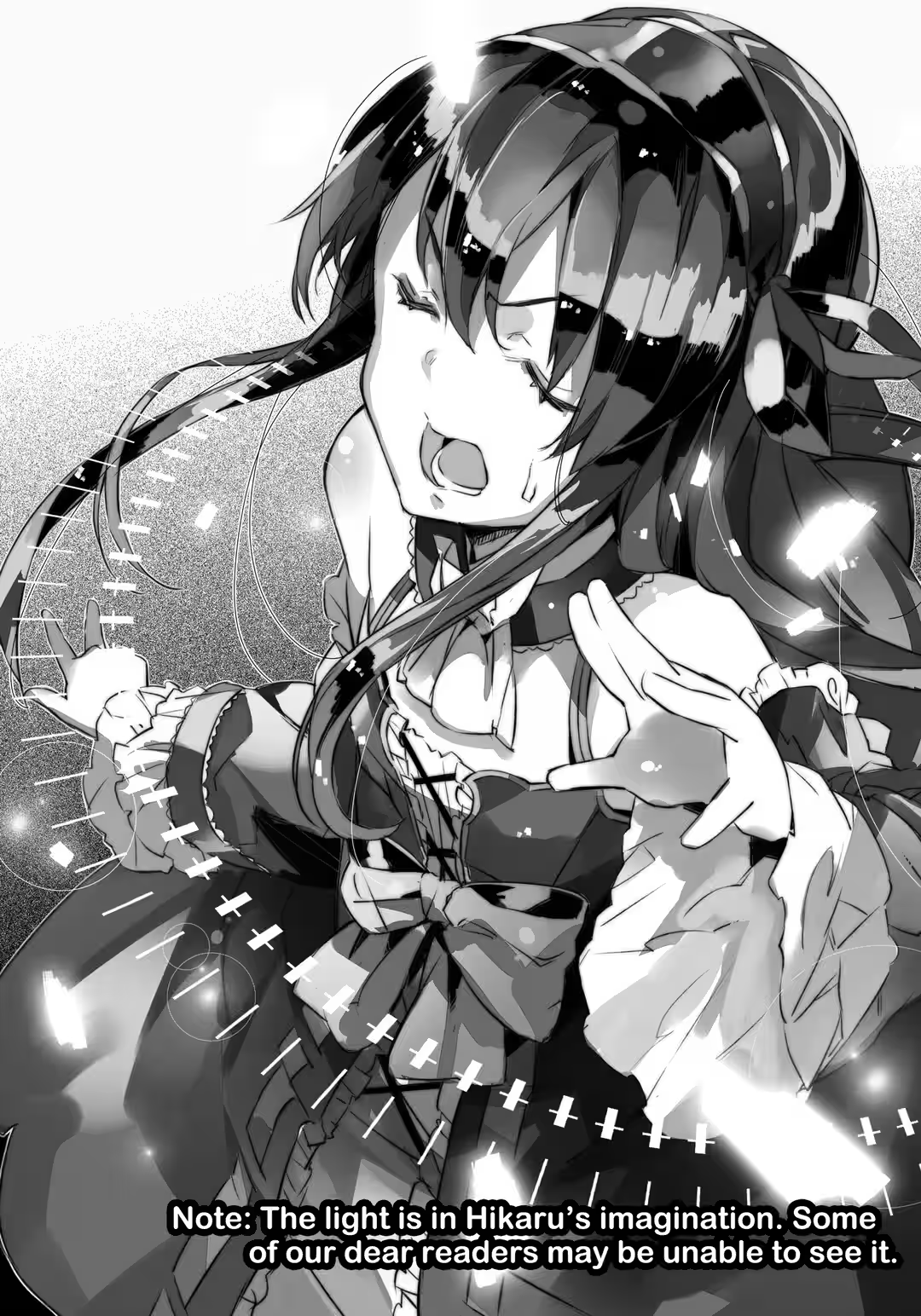
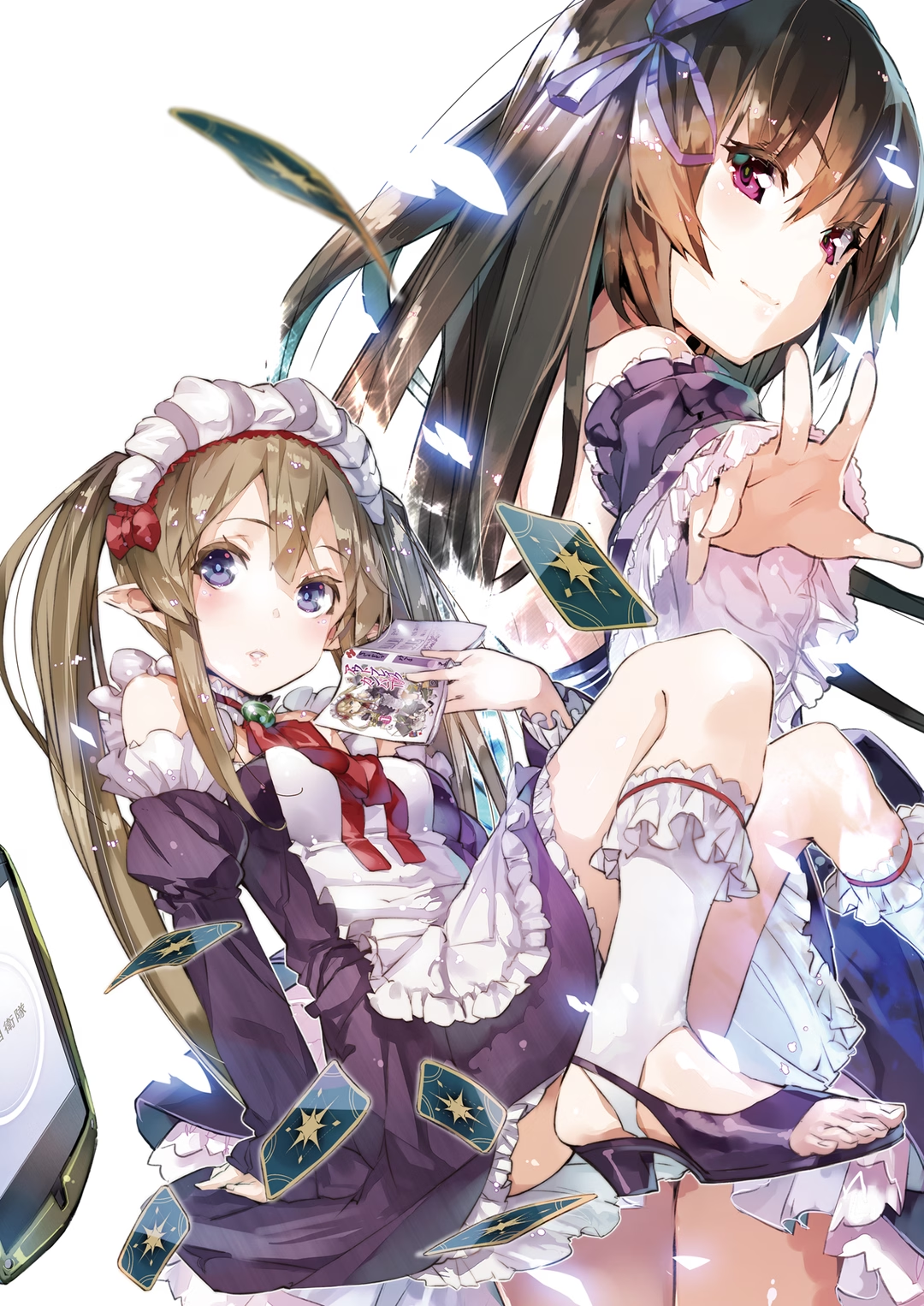
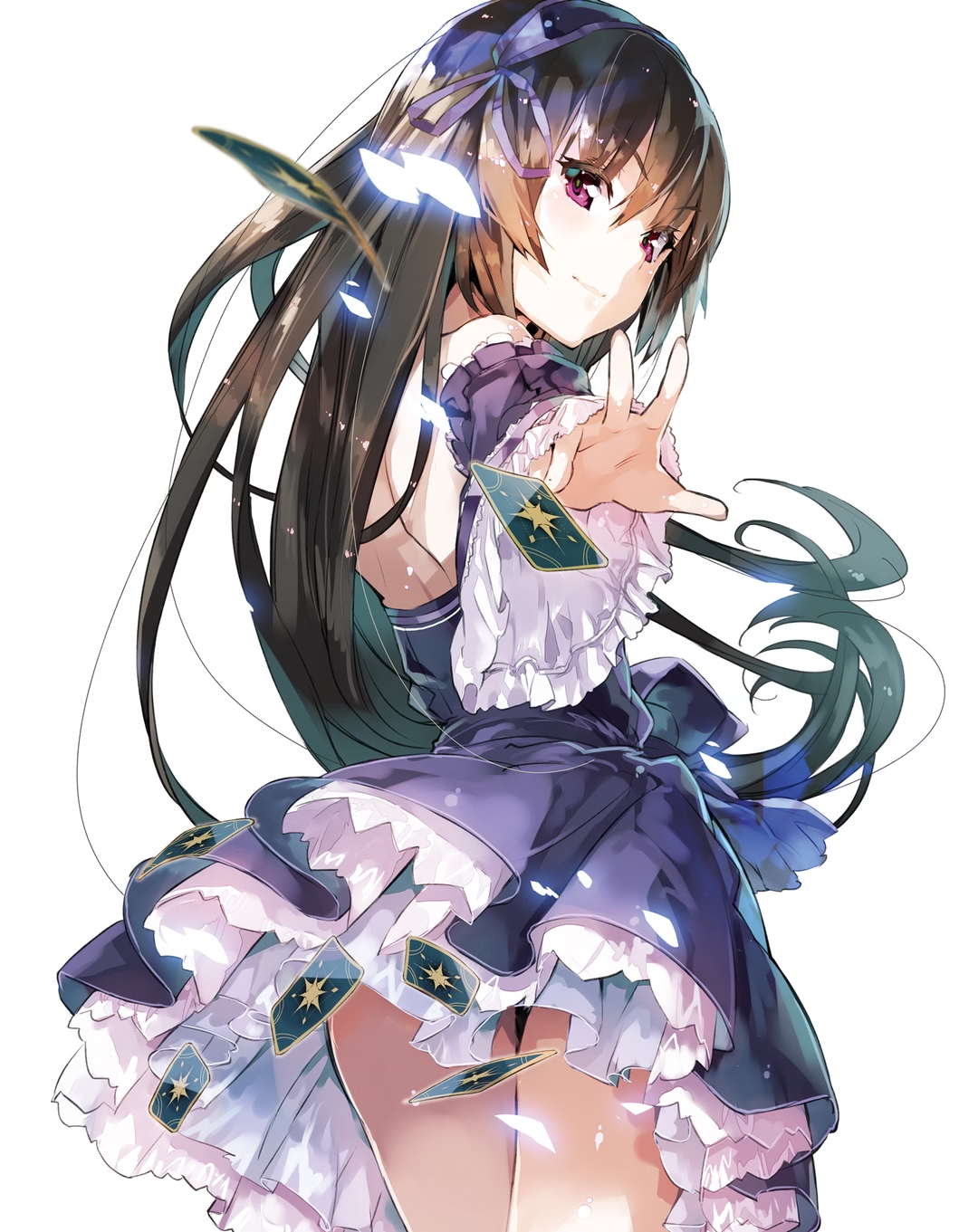
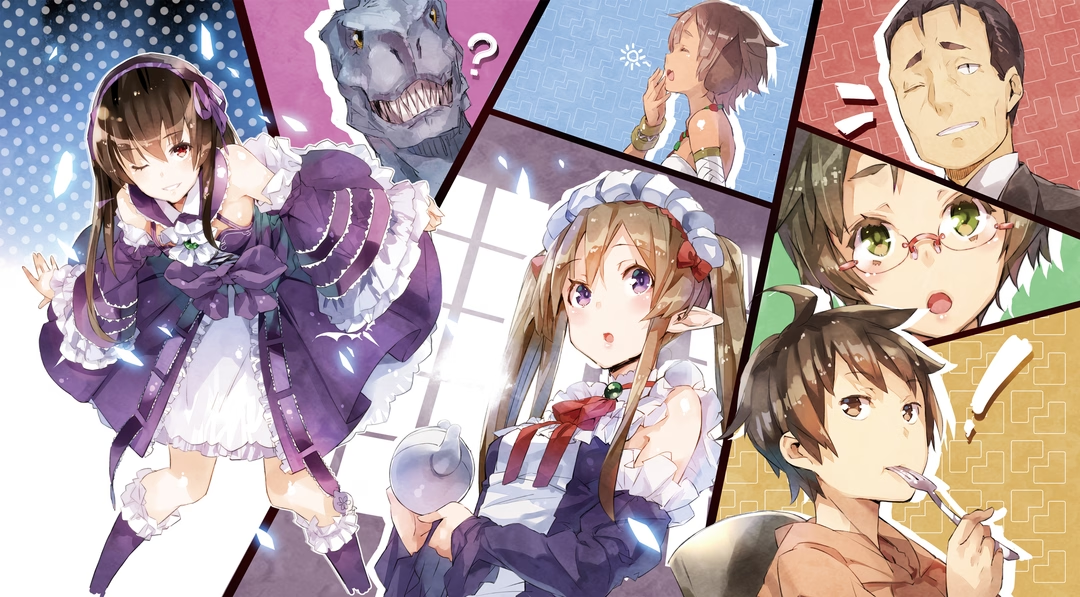
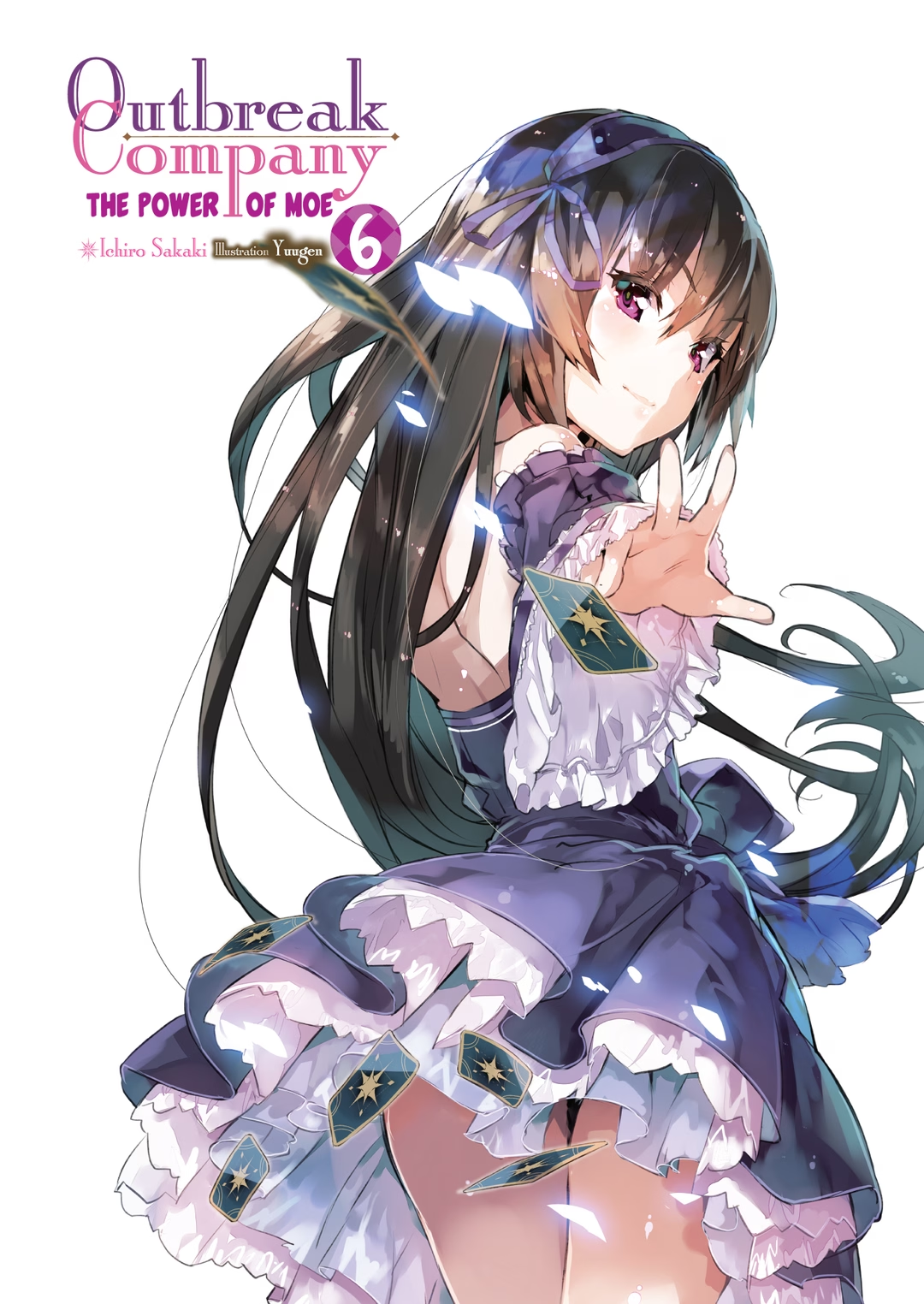
Chapter One: Do We Meet by Chance?
Looking back on it now, maybe I had a sense that something was coming.
There was a big, bright full moon that night. I was lying in bed, which was all well and good, but even when I closed my eyes I couldn’t quite slip into unconsciousness. Unable to fall asleep, but not able to muster up the energy to go do something, either, I just lay there, aimlessly passing the lazy time.
This was unusual—normally I’m a pretty good sleeper.
“Hrm...”
I sighed and opened my eyes at last. I could see the familiar shapes of my room in the semi-darkness.
I didn’t have any nightlight in my room, nor were there any lamps outside. When night fell around here, you were really closed in by the darkness. If there were clouds or rain at night, you couldn’t see your hand in front of your face. I had grown up with plenty of good old-fashioned urban light pollution, and I was a little shocked to find out how dark a night could really be.
But that’s how the world really works after sundown, after all. And it made the moon, when it was out, all the more conspicuous, bright against the canvas of night. With no air pollution, the sky was especially clear, with nothing to interrupt the cold, indifferent light from pouring down on you.
It all added up to the sense that the night was actually brighter outside than it was in my room.
“Hm...?” Suddenly, I frowned.
Despite the curtain over my window, I had the feeling something had moved outside.
Maybe an owl or a bat or something? We did have a forest adjacent to the mansion, which was supposed to be home to a number of nocturnal species. In fact, wasn’t there a big tree just outside my window? Maybe one of those night-dwelling animals was in the branches somewhere.
So it was no big deal. Nothing worth worrying about. Right?
But as I lay there in the dark, I couldn’t help thinking about it.
I snuck suspicious little glances toward the window—and I was sure I saw something like a shadow flicker there again.
I wasn’t imagining it. And it wasn’t an owl or a bat, I could tell now.
Naturally, I couldn’t make out the exact size or shape of whatever was out there. But I was pretty sure the birds and the bats in this area wouldn’t get any closer to our house than they had to... and they definitely wouldn’t tap insistently on the glass if they did.
“What the heck...?”
I sat up in bed, feeling distinctly suspicious.
The sound came again: tap, tap.
Two soft taps. Then a pause, then two more.
It didn’t sound like something just blowing against the glass in the wind. It was purposeful, clearly intended to get the attention of the person in the room.
That’s right: someone was knocking.
“At this time of the night?” I grabbed the smartphone by my pillow to check the time. The screen said 2:30 a.m.
I would have considered the night still young at that hour back during my time as a home security guard, but since moving to this mansion, I had adopted a more proper schedule. On most nights, I would have been sound asleep by now. So, I assumed, would everyone else in the house. It was that hour of the night when, as the proverb said, even the grass and trees were asleep.
So who was out there?
As I lay there in silence, I realized my whole body was stiff with fear. My mind was replaying old television programs I’d seen about paranormal phenomena.
What if it was a ghost? This world was full of things that would be considered occult or fantastical or even superstitious in modern Japan. Magic and sprites were well within the realm of the everyday around here. So it was entirely possible I was dealing with a ghost.
But even so...
My more than a dozen years growing up in modern Japan had firmly cemented in my mind the idea that ghosts = scary. It was practically instinctive. So I clung to any bit of logic that might help me deny the possibility. But still, what’s scary is scary.
Meanwhile, the sound went on.
Of course, it crossed my mind to simply pull the covers up over my head, pretend to be asleep, and insist to myself that I was just imagining all of this. Unfortunately, the pervasive silence made the tapping all too obvious. It’s like how once you notice the ticking of a clock, you can’t take your mind off it, and then good luck falling asleep again. It becomes impossible to ignore.
I kept lying there. And lying there.
Finally, I gave in.
I got out of bed and went over to the window. My heart was pounding so loud it was distracting.
A corner of my mind was busy asking, What am I going to do if there’s some awful monster there?
The classic Japanese ghost is a woman with half her face hidden with long, greasy black hair. Oh, but in the Western tradition there’s a lot of zombies, creatures who are rotting or whose faces are melting off. When it comes to anime, I guess weird ghosts aren’t as scary as a yandere with a hatchet who can’t quite meet your eyes and who— No! Not the time for that!
“How stupid am I, feeding my own fears like this? What good does that do?”
The procession of terrifying images flashed through my mind, my brain jumping from one to the next even as I wished it would stop. I’d come this far, though. It would be even worse to stop now.
I screwed up my courage, standing in front of the window.
Then I grabbed the curtains with both hands—and closed my eyes.
“I’m not afraid I’m not afraid I’m not afraid I’m not afraid, Kanou Shinichi is not afraid!” I chanted like a spell. “I’m not afraid because there’s no need to be scared! Be it a ghost or a faerie or a devil or a demon, if she’s also a beautiful girl then she’s not scary! There are plenty of moe ghost characters!”
A lot of them were even the heroines of their shows! Forcing myself to picture several such characters—aren’t those clumsy ghosts dressed as shrine maidens great?!—I pulled aside the curtains as hard as I could and flung open the window.
“Ghost! I see your true form—Otherworld Monster!!”
If there was really something paranormal out there, I figured I would pretty much be reduced to a tiny, frightened baby, so I shouted and struck a pose partly to encourage myself. Between me throwing the window open and the breeze gusting in, the curtains went billowing to the side.
And then it was just me staring out into the night.
I didn’t even get to those famous (?) words, “Spirit Wave of Light That Shines upon Immoral Beings!” before my mouth hung open.
There, bathed in the moonlight, was a girl. For a second, I almost thought she was floating in midair, but I quickly realized my mistake. She was sitting on a tree branch, watching me.
“Evening,” the girl said with a smile. Her voice was the slightest bit husky, as if she were caressing the ear of her listener with—
“Er... Hello,” I said, mostly reflexively. It was about as dumb a thing as I could possibly have said at that moment, but I had completely and totally lost my nerve.
Why? Because she was perfect.
Sitting there in the moonlight, she was terrifyingly composed; there was no way past her guard. She almost looked like a doll or something that had been prepared with anything and everything in mind. The slight tremble, the grace note of hesitance that real humans, for better or for worse, always have, she completely lacked.
Her big, black eyes, fringed with long lashes, stared straight at me. Well-formed brows peeked out from behind her bangs. Then there was the straight, smooth bridge of her nose, her soft-looking, fine lips. Everything combined for an enormous impact.
“Lovely night, isn’t it?” the girl said easily. The wind whistled and the leaves shook as if in agreement.
The wind picked up her hair, dark as the night itself, and tugged at the hem of her dress. She was wearing a Gothic-style dress with more frills than just about anything you would normally see. It was cinched at the waist but left the shoulders exposed, as if it existed not for the comfort of the wearer but only to make them look adorable. And on her, it worked.
There were a lot of dark colors on the outfit, but that made the abundant frills, the bare shoulders, and her white knees all the more striking—the contrast strangely enhanced her presence.
Wait... She seems less like a ghost and more like... a vampire!
Her very assertiveness made her seem like she wasn’t a ghost. Disembodied spirits seem like they hardly exist, like they might melt into the night at any moment—but this girl appeared to take the night, in fact, the moonlight itself, as a stage upon which to display her beauty.
She gave me an alluring smile, as if she could read my thoughts, and said, “The night wind shimmers in the moonlight—and it is very beautiful.”
“Hey...”
At that moment, I finally realized something: I recognized her dress.
I took a fresh look at her face—or more precisely, just above her face. And just as I expected, there was a dark-purple ribbon woven into her hair.
“Suiren...”
She was dressed like the character Suiren from the anime Rose Princess. It’s a show about dolls who battle each other, and Suiren is one of the villains, a doll who’s hostile to the protagonist. But her Gothic Lolita design, which is frankly better balanced than the heroine’s, ended up making her the more popular of the two characters.
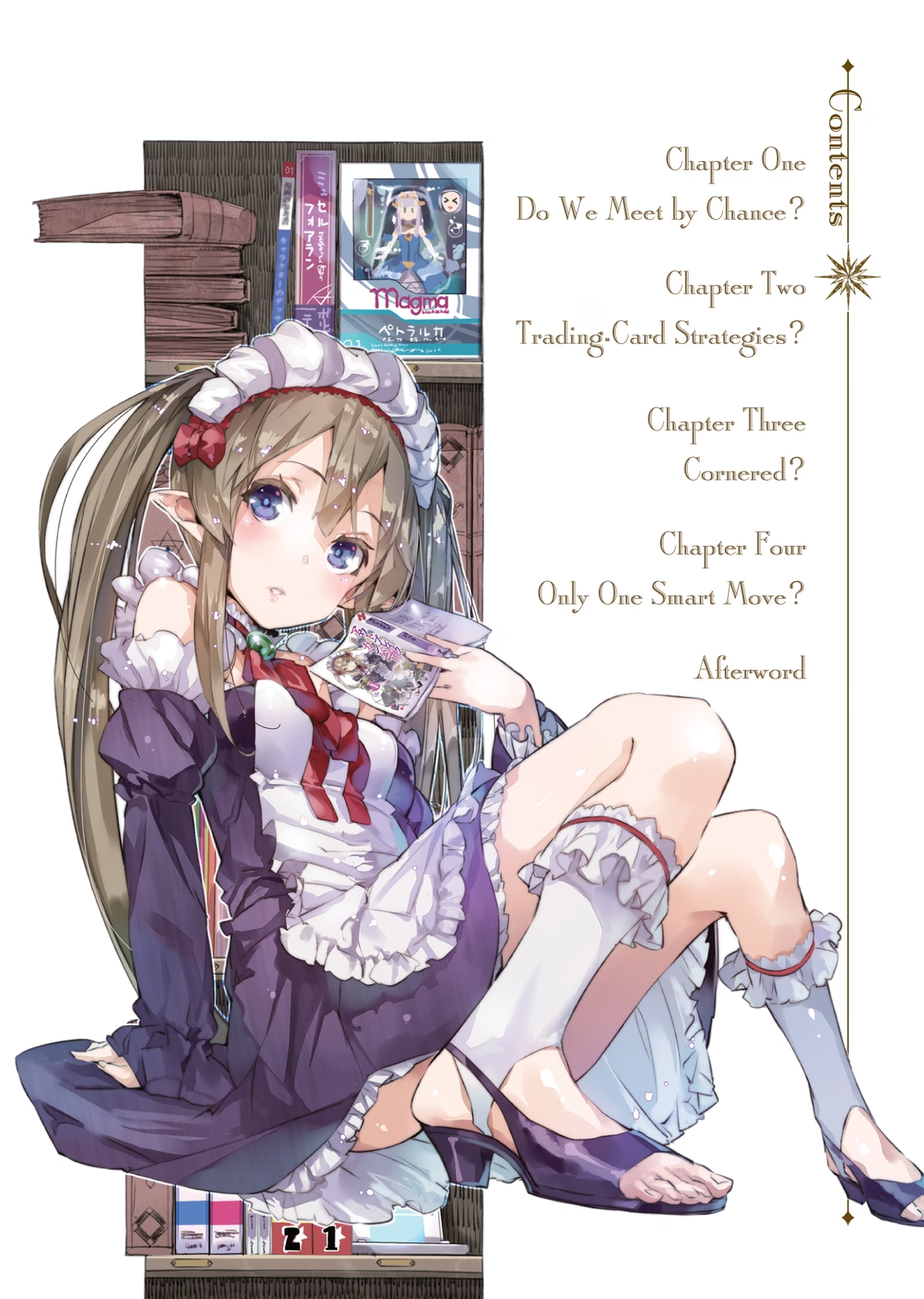
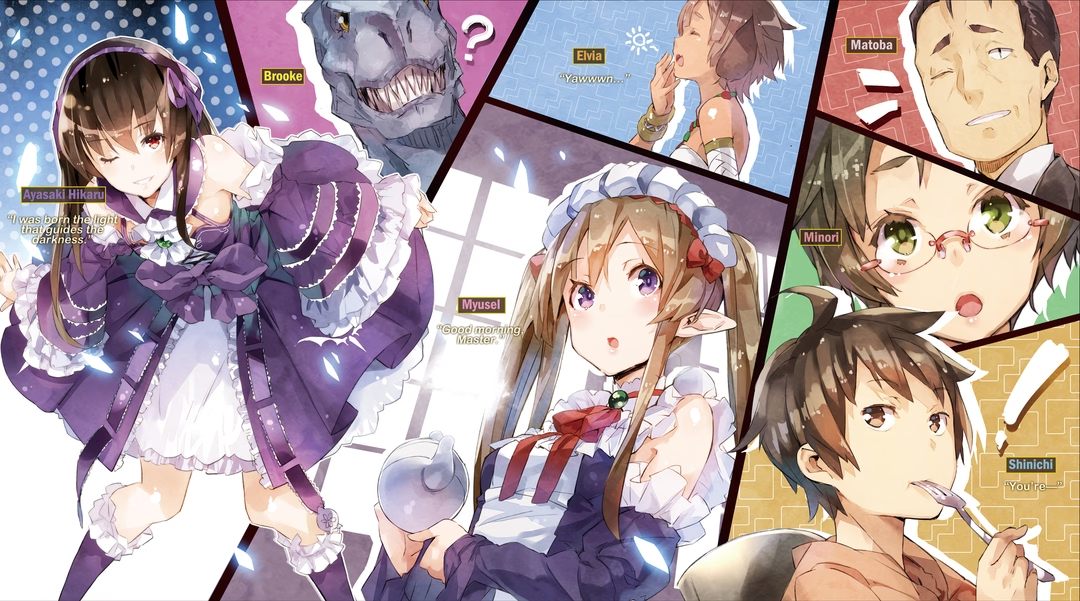
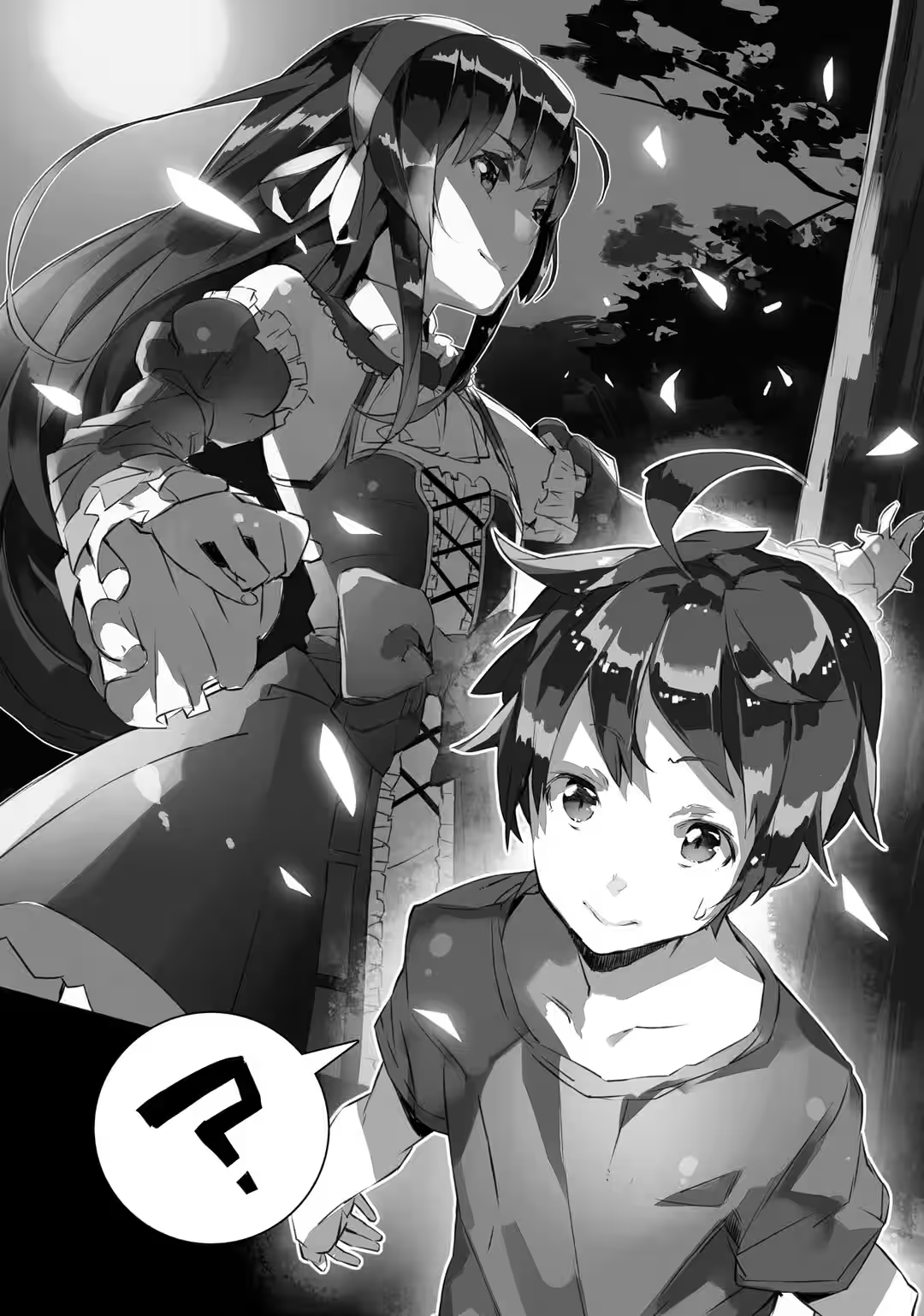
Chapter Three: Cornered?
Petralka was in excellent spirits.
“Ah, we understand now...!”
How do I put this? She looked... different.
Petralka had always looked like a young but well-manicured, attractive girl. But her clothes, position, and behavior had worked together to create the presence that was Petralka an Eldant III.
And so just by wearing different colors, different materials, she became like a totally new person.
“Oh ho!”
She was currently dressed in a Suiren outfit like Hikaru-san had worn at their first meeting. Of course, Hikaru-san’s costume would never have fit the empress; this was a new outfit he’d made especially for Petralka. Minori-san had already requisitioned a sewing machine back when we were doing costumes for our movie, so it was just a matter of getting some cloth and using it with the lace Hikaru-san had brought along. Add some fasteners to make it easy to get in and out of, some buttons, and a few other little details, and voila.
What was more, Petralka had taken off her crown and replaced it with a black wig, making her look even more different. She hadn’t gone so far as to wear color contacts, though, so her eyes were still their usual emerald green.
She looked... Well, she looked like a girl you could just fall in love with.
An old saying holds that one tires of a beautiful woman after three days, and it was true that I had kind of gotten used to the way Petralka looked—but the impression she made now was fresh and new, and inspired my heart to pound all over again.
“Wonderful!”
“I receive your words of praise with utmost gratitude,” said Hikaru-san, standing next to me on the carpet of the audience chamber.
Hikaru-san, Minori-san, and I were Amutech’s representatives in the audience hall at that moment. For the Eldant side there were Petralka and Garius. Royal guards waited just beyond the door, but inside, it was only us.
As ever, Hikaru-san blended perfectly into this environment. It went beyond simple etiquette; it was a matter of the ability to communicate. It was like he could choose his words and behavior in response to the way the other person looked and acted. Maybe it was a skill he had picked up from cosplaying. Dressing up just for your own amusement was one thing, but if you were going to be around other people, then you would have to branch out.
Maybe that was one way in which he was genuinely different from me. I really would have to learn from him on that point.
“Does it look good?” Petralka asked.
“Yes, Your Majesty, it suits you wonderfully,” Hikaru-san answered.
This was hardly flattery—it was the simple truth.
But when Petralka asked the question again—“Does it look good?”—it took me a good ten seconds to realize she was talking to me.
“Huh? Oh, s-sorry, were you asking me?”
“Who else would we be asking?” Petralka frowned.
“S-Sorry about that. Of course, it looks great.”
“You make it sound like an afterthought. You truly are uncouth, Shinichi. Don’t you think so, Hikaru?”
“I thought perhaps he was struck dumb by your beauty, Majesty.”
“We hardly share your supposition. Did you know, the first time we met, he took one look at me and immediately—”
“I told you, I’m sorry about that!” I said, with no choice but to apologize yet again.
I stole a sidelong glance at Hikaru-san, who was smirking. Then he said, “Your Majesty. As it happens, there is one more thing I wish to present to you.” He gave another respectful bow.
“Oh? The costume of another character?”
“No...” He pulled something out of his bag. “It’s this.”
“Hrm? What’s this?” Petralka leaned from her throne to see what Hikaru-san was holding out. It was...
“A card, Your Majesty. A trading card, of the kind we’ve been experimenting with selling among the common people. The cards themselves are imported from Japan, but we’ve assigned an artist to redo the packaging here in Eldant.”
“So we’ve heard. Your little spy friend from Bahairam, as we understand.” A wry grin passed over her face.
Petralka was well aware at this point that Elvia really was a spy for Bahairam (although by now, she was more of a double agent). Petralka also knew, however, that Elvia wasn’t very committed to her job, and that she had played a big role in rescuing me when I had been kidnapped by the other nation.
Hence the Eldant Empire was inclined to wink at her, and “the spy girl from Bahairam” had become something of a tongue-in-cheek nickname.
But even so, Elvia was who she was. She would absolutely never be allowed in this audience chamber.
“This is a card for which I asked our artist to attempt a brand-new illustration.”
“Hmm?”
“It’s an extremely rare, made-in-Eldant trading card—in fact, this is the only one that exists so far. The game that’s so popular right now is called Yugi WAR, and we based the design on that.”
“Oh ho!” Petralka leaned forward. “We cannot see it from so far away. Approach us.”
“Yes, Majesty.”
Hikaru-san came up to the throne as ordered. I caught a glimpse of the card in his hand as he went by. It was—
“This is—!”
Petralka was surprised, and even Garius, leaning in to look from beside her, raised an eyebrow.
“Is this Her Majesty?”
“I’m so happy you see the resemblance,” Hikaru-san said.
Yep: the illustration on the card was done in an anime/manga style, but it was clearly a picture of Petralka. Not in her current cosplay outfit, but in her usual clothes and her crown, and with silver hair. The illustration was hardly photo-real, but all the distinctive characteristics made it impossible to mistake the person in the picture.
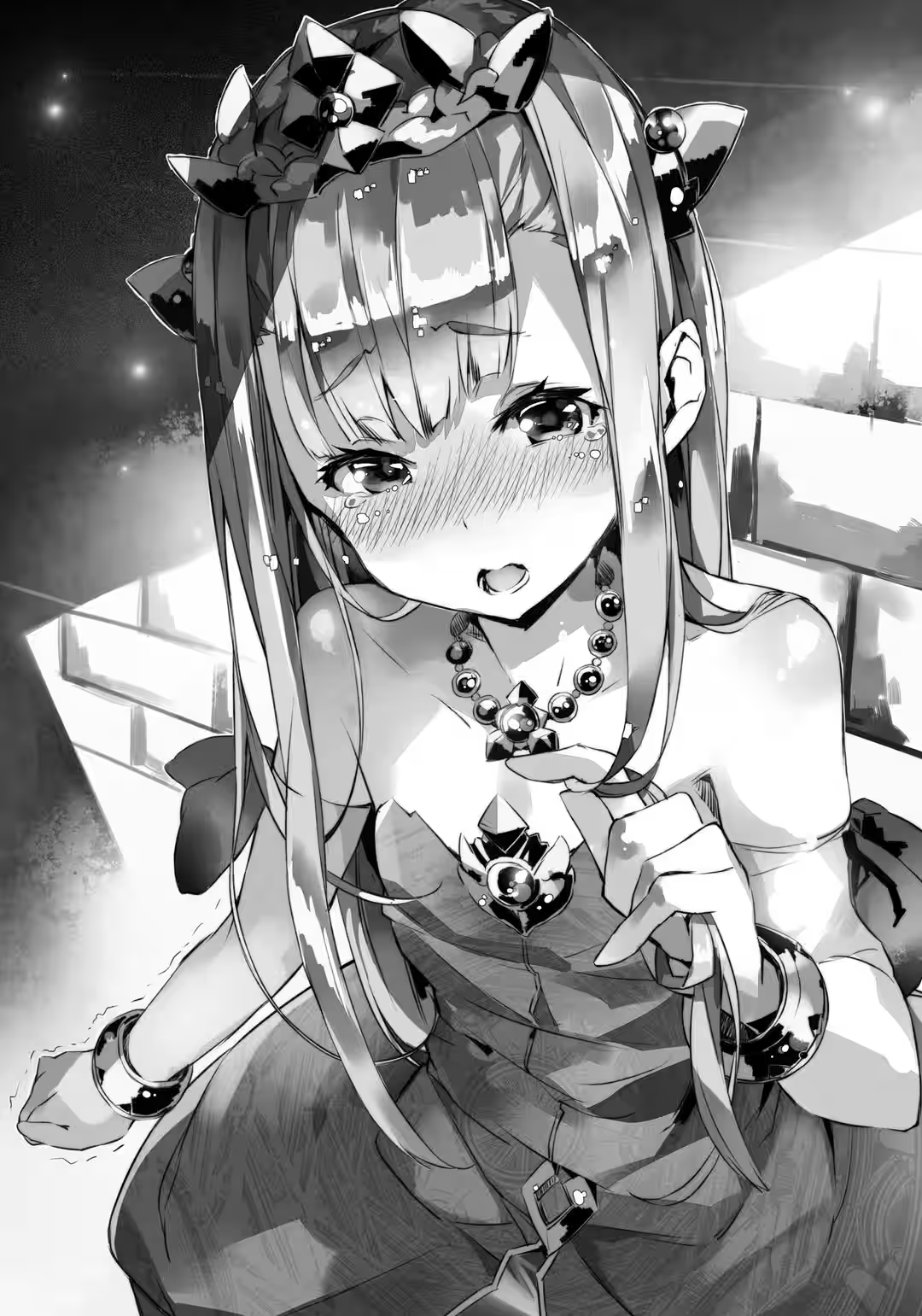
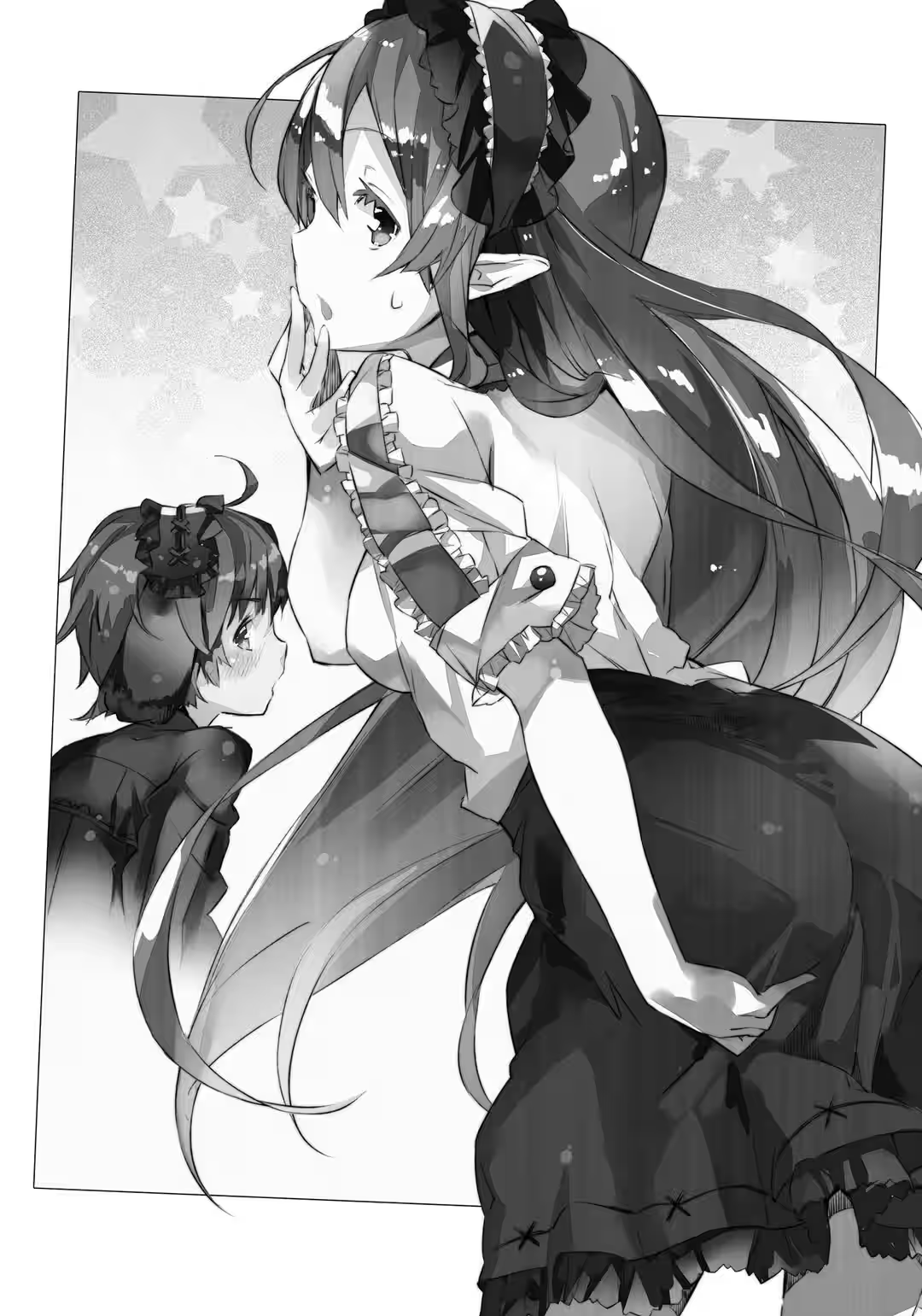
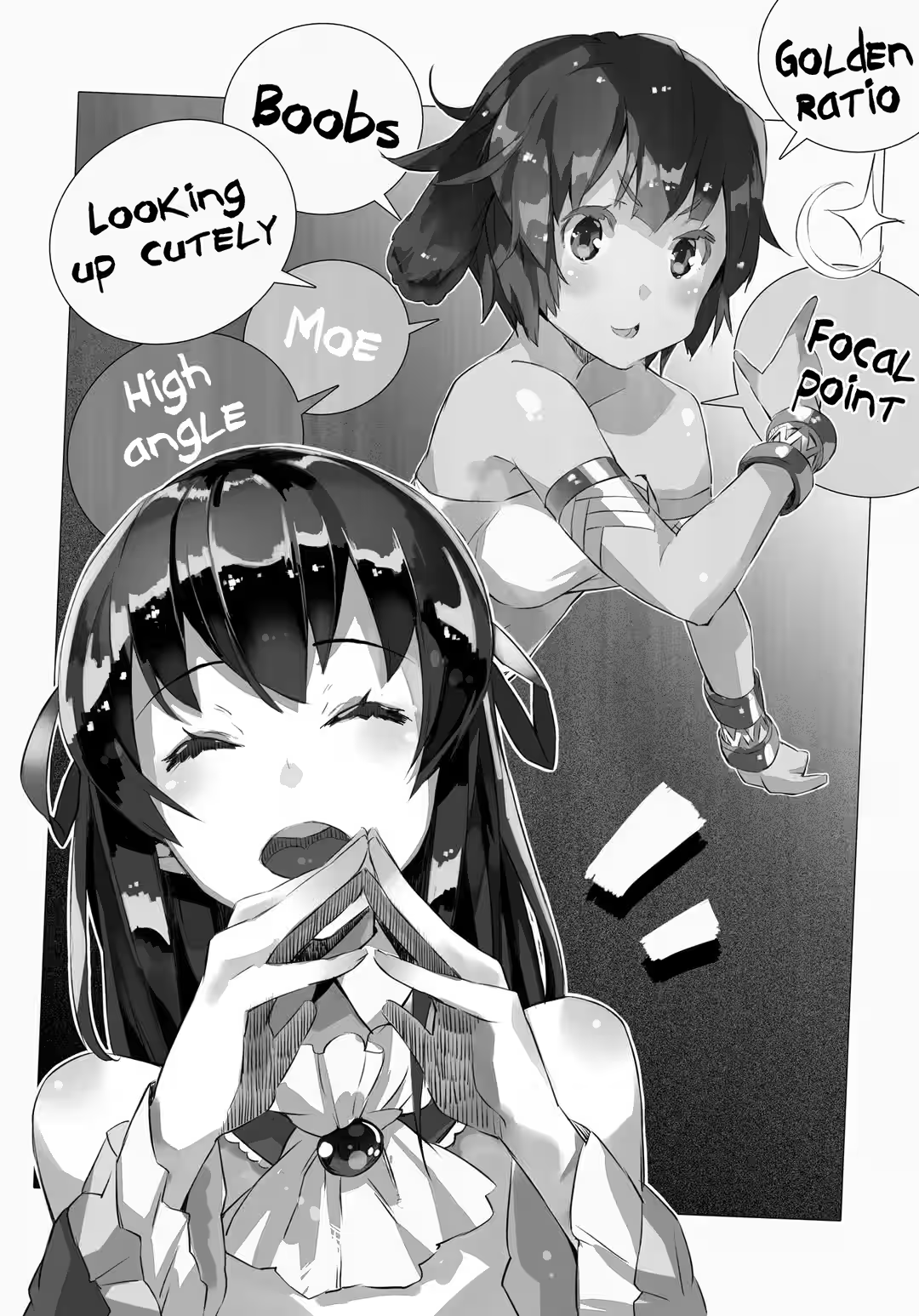
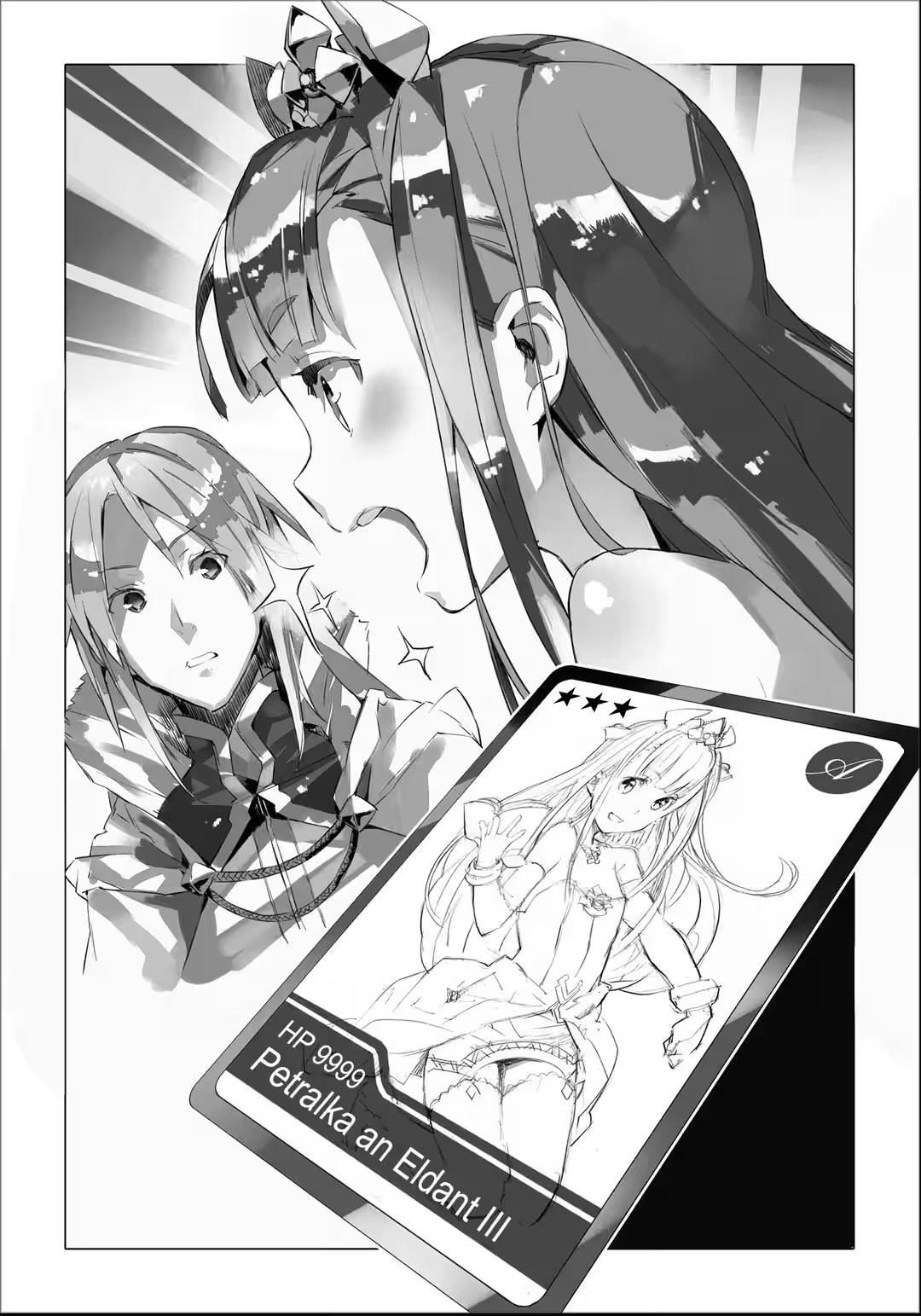

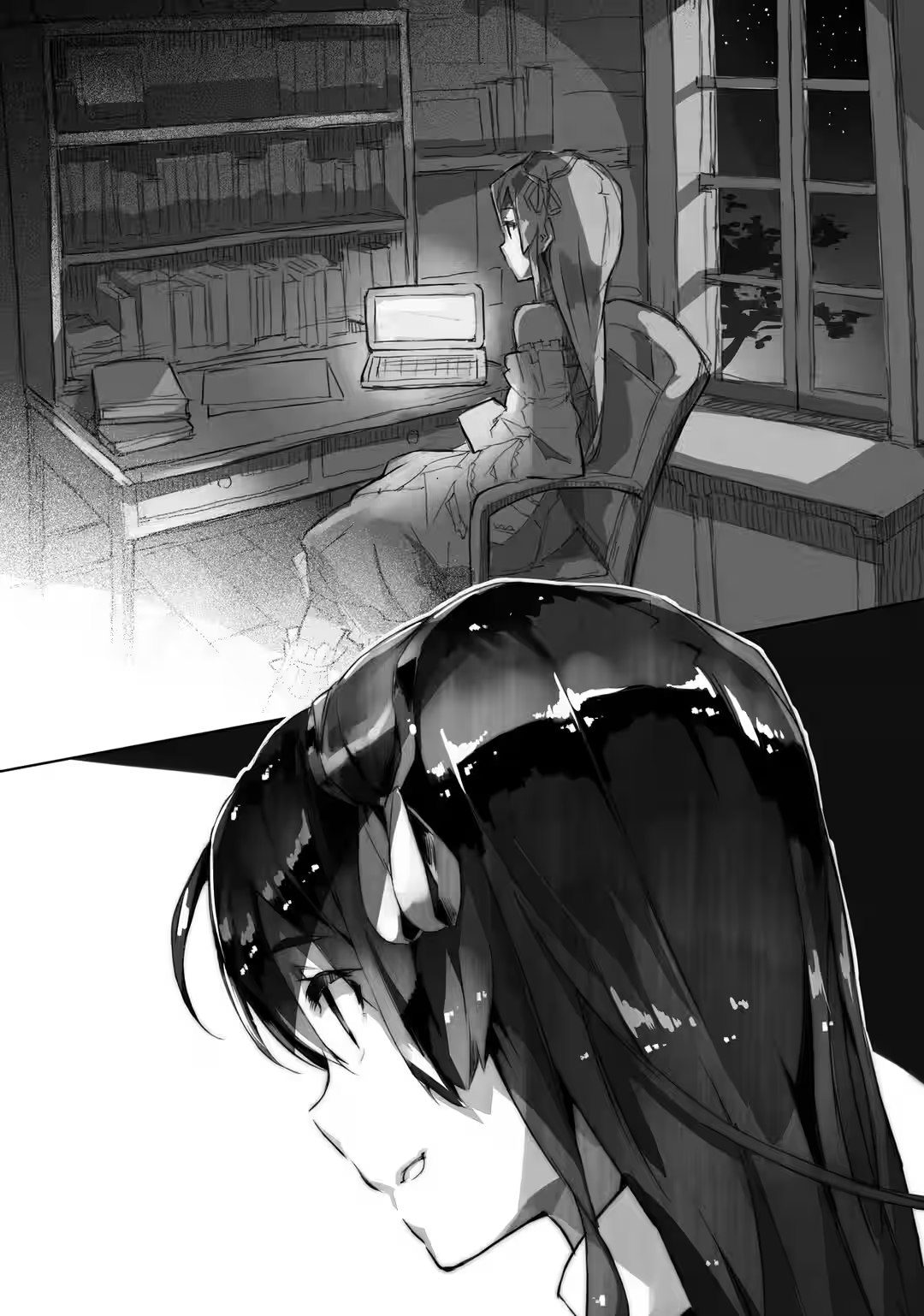
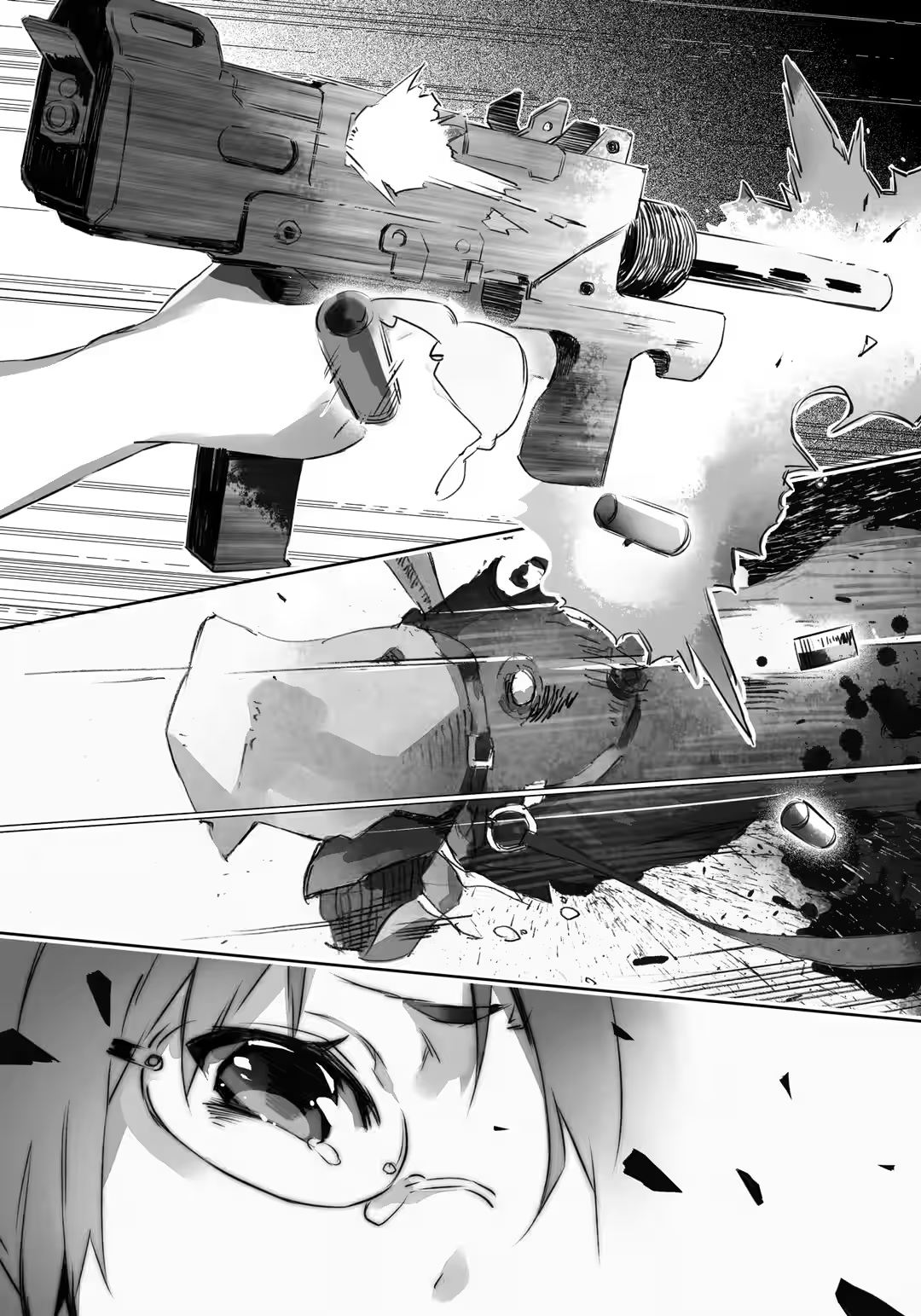
Afterword
Hullo! Light novelist Sakaki here, presenting you with Volume 6 of Outbreak Company: The Power of Moe.
Most of you who have picked up this book will probably have noticed this from the “obi,” but it’s been announced (as of May 2013) that following the manga adaptation, there’s going to be an Outbreak Company anime!
Myusel! Petralka! Minori! Elvia! And also, I guess (What do you mean, you guess?!) Shinichi, Brooke, Matoba, the LAV, and more will all move and talk for real! Well, the LAV won’t talk.
Actually, this is the seventh anime I’m going to be involved in, and the fifth to be adapted from one of my works. Yet every time, I’m so deeply moved by it. This is the second time I was present at the announcement of one of these anime, and combined with the fact that this is going to be the first show based on something from the Kodansha Lanobe line, I admit to being a little anxious about how it’s going to go.
On that note, I’m going to keep my hands off the scripting and such this time and just focus on writing the novels. I think they’ll have my head if I don’t. The schedule this year is really tight... (What, just this year?)
The upshot is, while I might get to watch the episodes a little earlier than my readers, I’ll be just as excited as all of you to see the finished product.
Okay, but what about this book?
Just as I teased in the afterword to the last volume, I’ve introduced Hikaru as a sort of rival (?) for Shinichi.
At first there were a lot of things about him that I found somewhat difficult to write, but when I got to work with him a second time (I mean when I did the revisions), I found I had managed to connect with him. I’ll leave it to you to read the book and see exactly what kind of character he is—but from the perspective of the work, he’s in something of a precarious position, so I’ll be curious to see how readers respond to him.
In this volume, I did a somewhat extreme take on trading cards and ero games, but I promise there’s no malice behind it. I think going overboard on anything, not just cards or X-rated games, can lead to arguments and problems; this book just happened to focus on those two things.
All right, then. If everything goes as planned, you should see the next volume in two or three months, where we’ll be taking a brief break from the main story for a collection of vignettes. I think the cover will finally feature you-know-who. Maybe.
I’ll see you next time!
Ichiro Sakaki
31 March 2013
Translator’s Notes
Illustrations
Figure
The brand name “Magma” on the box of the Petralka figure is a reference to the Figma brand. The multiple faces for the character, one of which is visible in the upper right of the box here, are a well-known feature of Figma products. The box whose spine is visible besides Petralka says “Myusel Fourant.”
Chapter One
Even the Grass and Trees
The proverb Shinichi is referring to is “Kusaki mo nemuru ushi mitsu-doki,” literally, “The third part of the hour of the ox, when even the grass and trees sleep.” In the past, timekeeping in Japan relied on a series of twelve “hours” (koku) based on the Chinese zodiac cycle, so that each of these divisions was equivalent to about two hours by Western timekeeping. In this system, the ox (ushi) represented the time before dawn, about 1 to 3 a.m. Koku could be further divided into four segments of about a half hour each, so the third segment (mitsu-doki) of the hour of the ox would be around 2:30 in the morning. Incidentally, this is also considered to be the “witching hour” in Japan, the time when one is most likely to encounter ghosts and spirits.
Clumsy Shrine Maiden Ghosts
Perhaps a reference to O-kinu, a ghost shrine maiden from the 1993 series Ghost Sweeper Mikami.
Otherworld Monster
In Japanese, zense majin. A reference to an early-70s drama called Diamond Eye, which features monsters who can change into human form. The allegedly famous words Shinichi never gets to say (“spirit wave of light that shines upon immoral beings” —in Japanese, gedou shoushin reiha) are used to force these monsters to reveal their true forms.
Rose Princess
The cleverly allusive Japanese is Bara-hime, which we’ve translated literally. The series is fictional, but is also a reference to Rozen Maiden, an early-2000s work about a group of porcelain dolls who are all named after different jewels. The character Suiren to whom Shinichi refers is probably a play on Suigintou, one of the characters in Rozen Maiden.
Turn into a Sword
Possibly a reference to Tenka Hyakken, a game in which some of the swords can change form between a weapon and an adorable shrine maiden.
Stealing Holy Relics
Probably a reference to the Fate series.
Burning Prostrations
Yaki-dogeza; i.e., prostrating yourself on something very hot (in the original metaphor, a teppan grill). The expression first appeared in the 1996 manga Tobaku Mokushiroku Kaiji (Gambling Apocalypse Kaiji).
Destiny
In the original, Shinichi says, “Think of the heft the word 運命 [destiny] has when you read it as sadame!” These two characters are usually read unmei (the standard word for “destiny”), whereas sadame typically means a law, a rule, or “what is appointed,” and might best be translated as “fate.” (Glossing a common word with a related word possessing a different nuance is fairly common in manga and light novels.) His point is that sadame sounds more portentous.
Señorita
The word o-jou-san (young lady) is glossed as senyoriita. Why? Not sure.
Itadakimasu
When Shinichi says he’s a little embarrassed to be reciting “itadakimasu” in unison because it feels like being in grade school, he’s thinking of how in schools in Japan, lunch is served in the classrooms, where the children all eat together. In fact, it’s also served and cleaned up by the students; much like cleaning up the school after class, this is considered a vital part of their education. At lunch, no one starts eating until everyone is ready and the whole class says “itadakimasu” together.
There’s an interesting secondary linguistic question about this line. In the original text, Shinichi and his housemates all simply say “itadakimasu.” However, it’s not entirely clear whether they’re all reciting the phrase in Japanese, or if there is some Eldant equivalent that Shinichi’s magic ring is “translating” as itadakimasu. We chose to include both a call-out to the Japanese phrase and an English translation partly in deference to this quandary and partly for the benefit of readers who may not be familiar with Japanese table customs.
Ayasaki Hikaru
Here, the name Hikaru is written as 光流 (light + flowing). In general, it’s more typical to represent this name with just the kanji 光. In addition, whenever the name is glossed in this book, the family name (Ayasaki) is written in hiragana, as is usual, while the given name is glossed with katakana. “Hikaru” is usually a masculine name in Japanese (the female equivalent would be Hikari), so maybe Shinichi should have suspected.
School Week
Shinichi says he was at school five and a half days a week. Saturday classes were standard in Japan until about 1992, after which they were phased out in principle; however, many schools continued to hold at least Saturday morning classes.
Order of the Dark Knights: Zero’s Revenge
A Code Geass reference, previously mentioned in Volume 4.
Shin-ku and Konpekisei
These two character names continue the reference to Rozen Maiden, which has characters named Shinku (written with different kanji) and Suiseiseki.
Kuuki Yomenai
When Shinichi says that he, like many otaku, “can’t tell what others are thinking,” the Japanese expression is kuuki yomenai. Literally meaning “unable to read the air” and sometimes abbreviated to simply “KY,” this expression describes someone who misses social cues and/or just generally doesn’t “get” what’s going on in the minds of people around them.
Layer
Short for “cosplayer.” The word comes directly from the Japanese (leiyaa, from kosupureiyaa). We aren’t aware of this expression having currency among English-speaking cosplayers, but the meaning is clear enough that we let it stand.
The Gift of the Magi
This is a short story by O. Henry. In it, a woman sells her long hair in order to buy her husband a watch fob for Christmas. When he gets home that night, her husband reveals that he bought his wife a set of ornamental combs for Christmas—but he had to sell his precious watch to do it. The two of them realize how far they’ll go for each other. The connection to what Shinichi says here seems to be strictly that the story invokes the selling of hair (remember that he mentions, in passing, wigs being made of real hair).
Bathing
In Japan, it’s not uncommon for several people to bathe together when there’s a suitably large tub available. Although mixed baths (kon’yoku) do exist, most public bathing in Japan is separated by gender. Hence, it wouldn’t actually be that unusual for Shinichi and Hikaru to bathe together—it’s just that at this point, Shinichi is under some misconceptions about who Hikaru is.
A Real and Fulfilling Life with a Woman
Shinichi uses the term riajuu, a bit of 2-chan slang derived from “someone with a fulfilling (juujitsu shita) real (riaru) life.” Normally it refers, with a mixture of derision and envy, to people who are in a happy, committed relationship.
Do You Want Me to Explode?!
A Twitter expression with its roots in 2-chan, meaning basically, “Do you want me to get angry?” We might use the expression “pull an Incredible Hulk.”
Chapter Two
A Wasted Opportunity
Shinichi says that even with (what he assumes is) a beautiful woman right there next to him, he doesn’t have the nerve to simply say, “Well, it would be a shame to waste an opportunity when it comes knocking, ho ho ho!” This line, somewhat verbose in translation, refers in the original to the saying “suezen kuwanu wa otoko no haji da,” literally, “It’s to a man’s shame not to eat a meal set out for him.” Here, suezen has the figurative meaning of a woman’s advances—that is, when a girl is practically throwing herself at a guy, he should be embarrassed not to act.
I Mustn’t Stand Up
Alludes to Shinji’s famous mantra “I mustn’t run away” from Evangelion.
Calm Down and Count Your Prime Numbers
Another catchphrase from JoJo’s Bizarre Adventure.
Dead Twin
A reference to a scene in Adachi Mitsuru’s Touch!, in which the protagonist goes to a hospital morgue to view the corpse of his older brother after the latter’s death.
The Yaranaika Guy
Known in Japanese as “Abe-san,” Abe Takakazu is a character who has come to represent a certain kind of gay person on Nico-Nico; he’s especially famous for claiming, “I don’t mind straight boys” (nonke demo kuu).
Harmful to Youth
Yuugai zusho (“harmful books”) is what the Japanese call books that are considered to portray sex or violence in a way detrimental to young readers. The determination of what books (or games, etc.) fall into this category can be made on either the national or local level.
My Maidenhead before My Virginity
Shinichi says he doesn’t want to lose his 処女 (shojo) before his 童貞 (doutei). Shojo means a female virgin, while doutei is a male virgin, and what he seems to mean is that he doesn’t want to lose his virginity to a guy instead of or before a girl.
Resumes
The Japanese resume (rirekisho) usually follows a very specific format, and includes details that would not be found on a resume in, for example, the United States—including gender. This is why Shinichi surmises Matoba would have known Hikaru’s gender on account of having seen his resume. (Incidentally, rirekisho also include a space where the applicant is expected to paste a passport-sized portrait photo.)
Card Costs
Hikaru suggests that “a pack of ten cards costs a hundred yen.” At current exchange rates and making no adjustment for inflation, that would be a little less than one US dollar.
Comiket
A semi-annual “comics market” held in Tokyo. Chiefly features doujinshi or fan-made works, some original and some based on existing properties.
Takai-sensei & Misagi-sensei
These are probably references to Takarai Rihito (author of, among other things, the manga Ten Count) and Misasagi Fuhri, the artist for a game called Kichiku Megane.
Gakuen Rakuen
A reference to Gakuen Heaven, an old BL game. (Gakuen means “academy”; rakuen is the Japanese word for heaven or paradise, although it’s represented with the katakana loanwoard Hevun in the title of the original game.) Gakuen Heaven and Kichiku Megane were both released by a company called Spray. Although the Gakuen Heaven franchise originated with a PC game, it expanded to include a variety of media, so the “fan disc” mentioned in the text could be any of several things.
Put Ice on a Century-Old Love Affair
This isn’t a reference as such, but essentially proverbial; the phrase refers to any information (such as about a character trait or perhaps a bit of personal history) which, if known, could cause someone’s feelings for a person to change immediately. Here, Shinichi means that Minori’s unabashed adoration for BL material could cause someone to reconsider how they felt about her.
The Drawl
In Japanese, Shinichi suddenly begins speaking in Kansai (Osaka-area) dialect. This accent is generally considered to be humorous in Japanese (at least by people who don’t speak it), hence Shinichi’s reasoning.
It’s Always My Turn
Zutto ore no taan!, a Yu-Gi-Oh! reference.
Playing for Keeps
In its earliest forms, the seminal trading-card game Magic: The Gathering not only had “ante” (a randomly drawn card each player wagered at the beginning of the game), but made this feature a part of the gameplay, with some cards that instructed players to add another card to the ante or do other things with it. Ante eventually fell out of favor and was dropped from the rules many years ago. We mention this only for interest, and not to suggest that this scene is necessarily an M:TG reference; informal and to a lesser extent formal use of ante has surrounded plenty of similar games.
The Opium Wars
The two conflicts collectively known as the Opium Wars took place from 1839–1842 and from 1856–1860. Shinichi describes their motivation and methods pretty accurately; setting aside the effects of the actual drugs on Chinese society, the wars weakened the already ailing Qing Empire and allowed the British Empire to claim swaths of Chinese territory. The wars were an early feature of what China would later term its “century of humiliation,” during which the once-great empire was increasingly subject to territorial division and punitive treaties at the hands of the major European powers as well as Japan.
Chapter Three
An Old Saying
The proverb goes, “Bijin wa mikka tateba akiru” (one tires of a beautiful woman after three days). It sometimes continues, “busu wa mikka tateba nareru” ([and] one gets used to an ugly woman after three days). The implication seems to be that looks aren’t as important as one might think in choosing a partner.
Yugi WAR
The first part of this name probably plays on Yu-Gi-Oh!. The second part may be a reference to Gundam War, a collectible card game first released in Japan in 1999 and which continues to this day. Alternatively, “war” may simply be a broad obfuscation of the sound “Oh.”
Myuul-tan
-Tan is a particularly diminutive honorific.
Cave of the Sun Goddess
Called Ama-no-Iwato (“the stone cave of heaven”) in Japanese, this comes from a myth in which the sun goddess Amaterasu retreats to said cave after her brother, the storm god Susano-o, treats her outrageously. Amaterasu stays in the cave, depriving the world of light. The other gods decide that in order to lure the sun goddess out, they’ll hold a raucous party just outside the entrance to the cave. (The party famously features one of the other goddesses doing a striptease.) Amaterasu, curious about what’s going on, peeks out, whereupon the gods pull her back into the world and seal the entrance to the cave with a stone. A more aggressive localization might translate this phrase as “fortress of solitude.”
Kamishibai Games
Kamishibai (“paper plays”) as a traditional form of theater in Japan using paper dolls. In video games, it refers to a genre similar to visual novels, but usually without any choices at all to be made by the player.
Probatio Diabolica
Latin for “the devil’s proof,” this is a fancy way of saying that you can’t prove a negative. To prove that something is possible, only one positive or affirmative example must be found; by contrast, to prove that something is impossible, in principle, every possible case would have to be tested and the result found to be negative. For example, I might claim that you can’t fly by jumping off a cliff, but since there are an infinite number of conceivable cases of people jumping off cliffs, and any one of them might—just might—result in someone flying instead of plummeting to their doom, I can’t technically prove my claim. In this scene, Hikaru asks Shinichi to prove that ero games and the like are not related to otaku committing crimes, which Minori calls out as impossible to do.
Chapter Four
Schadenfreude
The Japanese translated using this word (itself German for “joy at harm”) is meshiuma. It’s short for the expression tanin no fukou de kyou mo meshi ga umai, or “Other people’s unhappiness makes my food delicious today as well.” Or if you will, “The sorrow of others is the best spice.” Yikes!
Boyish Girls
In Japanese, bokukko, literally referring to girls who use the first-person pronoun boku to refer to themselves. Boku is more typically associated with young men, so girls who use it are sometimes considered to sound tomboyish or less feminine.
Charlie Chaplin Moustache
A chobi-hige, sometimes called a toothbrush mustache. The “glasses” Shinichi mentions are probably those the Major wears. The Major doesn’t have a mustache, but there’s someone close to that character who did have this sort of facial hair: Adolf Hitler.
Yes Lolita! No Touch!
This was a catchphrase used in the manga magazine Comic LO. It was basically intended to exonerate lolicon and its readers by establishing that “a gentleman” (note Shinichi’s use of this word in his speech) might fantasize about having encounters with children, but would and should never act those fantasies out.
The Major and Gi***n
Shinichi’s speech in the courtyard directly parodies two well-known anime speeches. The first (beginning with, “Friends, I love pretty girls”) is the “I love war” speech from Hellsing Ultimate, delivered by a character called “the Major.” Our English translation for the speech leans on but doesn’t slavishly follow the English dub of the original. The second major segment of Shinichi’s oration (beginning at “Let me be clear”) is based on a speech given by Gihren Zabi in Mobile Suit Gundam (sometimes called the A Baoa Qu Defense Speech). Though an English dub of this scene exists, it is considerably freer than the English script of the Major’s speech, and thus didn’t lend itself as well to being adapted for this parody. For that reason, the English translation of the second part of Shinichi’s courtyard speech more reflects the Japanese original than the English dub of the scene being parodied.
